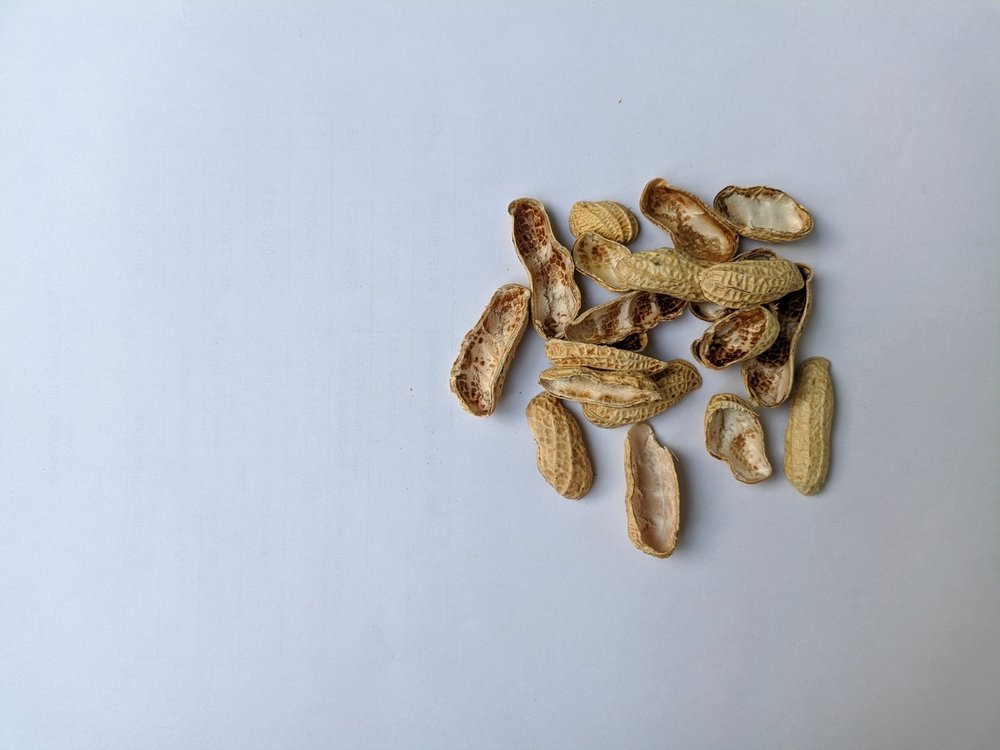Peanut butter is considered a healthy, tasty treat for dogs, although it should only be fed in moderation and owners should avoid sweetened or salted peanut butter. The nuts themselves are not considered toxic, either, but their high-fat content means you should really avoid feeding peanuts to dogs regularly.
But, for some owners, that leaves the question of whether it is safe to feed peanut shells to dogs. The shells can be sharp and their rough exterior texture makes them difficult to digest, so while your dog might be fine if they have eaten a shell, you shouldn’t intentionally feed them.
Some types of nuts, like macadamia nuts and black walnuts are very toxic to dogs and should be avoided completely. Whereas some, like peanuts and cashews, are safe in small quantities and when fed occasionally.


Why Can’t Dogs Eat Peanut Shells?
Strictly speaking, peanuts are legumes and part of the pea family, rather than the nut family. However, they are generally considered nuts because of their texture and other properties. The peanuts and shells are not considered toxic to dogs, so if your dog has eaten a peanut with its shell on, they should be safe in this regard.
However, the shell itself can splinter and leave sharp edges while it’s not common nut shells have been noted as a cause of intestinal perforation in children1, so they present some risks to dogs. The rough exterior texture of the shell also means it can get stuck in the throat and may prove very difficult to digest.


Dangers of Feeding Peanut Shells to Dogs
Although the peanut and its shell are not toxic to dogs, there are several reasons you should prevent your dog from eating them.
- Textured Exterior – The exterior of the peanut shell is textured and somewhat rough. This can lead to the shell getting stuck in the throat or teeth, leading to some discomfort.
- Fibrous Shells – The shell is known to be very fibrous. This makes it difficult to chew and even if the shell is boiled first, it is challenging to digest and process. This can lead to a digestive upset, or potentially an obstruction if lots of shell is eaten.
- High-Fat Content – Peanuts themselves are high in protein, vitamins, and minerals. But, while they’re not strictly nuts, they do share at least one property with nuts: they are high in fat. Because they’re high in fat, peanuts are also known to be high in calories, so they should not be a regular addition to your dog’s diet or they can cause unwanted weight gain, obesity, and pancreatitis.


What To Do If Your Dog Has Eaten Peanut Shells
Peanut shells are not toxic, so you don’t have to worry about toxicity. However, they can be difficult to swallow and even more difficult to digest. If your dog has eaten a lot of peanut shells relative to their size call your vet for advice as they are at more of a risk.
Peanut shells can cause vomiting and diarrhea, so you will need to watch for these. If you notice any issues call your vet to book an appointment. More severe signs that could indicate a more serious problem are severe diarrhea, vomiting, and anorexia. If this is the case, you may need to visit the emergency clinic.
If you have the all clear to monitor your pet at home, ensure they have plenty of water to drink. Your vet may recommend feeding your dog something like boiled pumpkin to help them pass the shells.




Can Dogs Eat Peanuts?
Peanuts, like their shells, are not toxic, so they won’t cause toxicity or serious long-term harm. Although rarer in dogs, peanut allergies can occur in canines. Watch for signs of allergic reaction like hives, facial swelling, vomiting, difficulty breathing, or collapse.
Otherwise, peanuts are considered safe for dogs to eat as a very occasional treat and in small quantities. They are packed with protein and contain a good variety of vitamins and minerals. However, they also contain a lot of fat and calories.
When it comes to feeding your dog peanuts, it’s best to do so sparingly and as a treat rather than part of their regular diet. Peanut butter is a popular treat for dogs due to its tasty and nutritious qualities, including protein, vitamins, and minerals. However, there are some considerations to keep in mind.
Avoid peanut butter sweetened with xylitol, as this can be toxic to dogs. Opt for natural peanut butter with no added ingredients for the healthiest option. Peanut butter is high in fat and calories, so it should not be given too frequently or in large quantities to avoid pancreatitis, which can cause vomiting, diarrhea, and loss of appetite.
There are peanut butter products specifically made for dogs, but they are usually similar to plain, natural, unsweetened, and unsalted peanut butter available for purchase. While the peanut itself is not toxic, the fibrous nature of the shell makes it difficult to digest and can pose a choking hazard.
In conclusion, while peanut butter can be a tasty treat for your dog and useful for enrichment activities, it should be given in moderation. Peanuts themselves should only be offered occasionally as a special treat due to their high-fat content. Remember to always prioritize your dog’s health and well-being when incorporating treats into their diet. text in a different way:
Please provide an alternative version of the text for me to rewrite.

